Snapback would draw ‘decisive response,’ Iran says

Tehran would issue a firm response if European governments trigger the snapback mechanism under UN Resolution 2231, Iran’s Deputy Foreign Minister Kazem Gharibabadi said Sunday.

Tehran would issue a firm response if European governments trigger the snapback mechanism under UN Resolution 2231, Iran’s Deputy Foreign Minister Kazem Gharibabadi said Sunday.
“We have made it clear to the United Nations and the Security Council that such a step is a misuse of international structures, and the Islamic Republic will respond decisively,” he said.
Speaking to parliament’s national security and foreign policy committee, Gharibabadi said Tehran instead suggested talks on formally ending both the resolution and the snapback clause.
The government remains committed to the law suspending cooperation with the International Atomic Energy Agency, Ebrahim Rezaei, the committee’s spokesperson, quoted Gharibabadi as saying.
President Masoud Pezeshkian enacted the IAEA suspension law early in July, following its approval by parliament and the Guardian Council. Rezaei described the legislation as “binding and enforceable.”
European states have failed to uphold their obligations under the nuclear agreement, the deputy foreign minister said, and therefore “have no right to activate snapback,” according to Rezaei.
Meanwhile, hardline newspaper Farhikhtegan warned in an article of escalating tensions, the possibility of military conflict, and the formation of a global consensus against the Islamic Republic following activation of the snapback mechanism by European countries.
Iran aligns with China, Russia on snapback response
Tehran had held a trilateral meeting with Beijing and Moscow to coordinate a joint stance in case the European powers move to reimpose UN sanctions, Gharibabadi told the committee.
His comments follow renewed scrutiny of Iran’s ties with its two main partners.
On Sunday, Revolutionary Guard political deputy Yadollah Javani responded to domestic criticism over Chinese and Russian inaction during Israeli attacks by saying Tehran had made no request for support.
Long-term agreements with both countries “do not oblige them to defend the Islamic Republic during war,” he added.
Separately, Saudi outlet Al Hadath reported that the United States is pressuring China to halt Iranian oil imports.
Beijing has expressed willingness to reduce purchases if offered lower prices elsewhere.
Citing informed sources, Al Hadath also reported that according to US assessments, the administration of US president Donald Trump may have no more than one year left to act against the Islamic Republic’s nuclear program.
“Washington does not intend to give Tehran any opportunity to rebuild its power,” wrote the outlet.
US President Donald Trump repeatedly said that American airstrikes had obliterated Iran’s nuclear infrastructure.
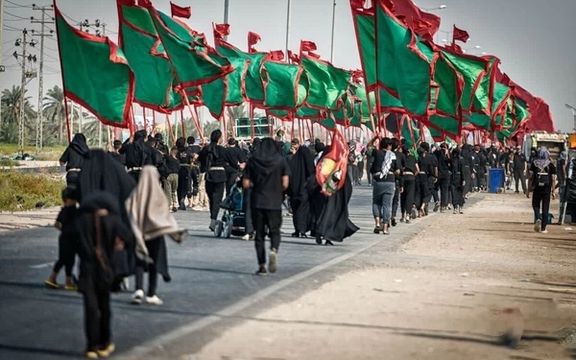
Mofid Hosseini Kouhsari, deputy for international affairs of Iran’s seminaries, has called on Iranian pilgrims traveling to Iraq for the upcoming Arbaeen pilgrimage to refrain from criticizing forces aligned with Tehran, including the Iran-backed Hashd al-Shaabi militia.
“Hashd al-Shaabi ensures the security of Arbaeen,” Kouhsari said. “We should not say anything that undermines the importance of our allies or the resistance forces. This is a shared position we must uphold.”
He cautioned against openly voicing political opinions about Iraqi factions, warning that doing so could trigger internal tensions. “There is no reason for our pilgrims to speak freely and recklessly about Iraq’s political currents. God forbid it leads to discord,” he added.
Since the 2003 US invasion that ousted Saddam Hussein, numerous militias have emerged in Iraq, many with ties to Iran. Following the outbreak of the Israel-Hamas war in October 2023 and the recent Israel-Iran escalation, including US strikes on Iranian nuclear sites, the pro-Iran factions have periodically targeted US bases in Iraq.
Groups within the Popular Mobilization Forces (PMF), an umbrella group of mostly Shia armed groups originally formed to fight the Islamic State and then integrated into Iraq's security forces, have been among those involved.
A focal point of US-Iraqi tensions lies in the future of the PMF. Though nominally under Iraqi military command since 2016, many PMF units maintain strong ties to Iran and operate with broad autonomy.
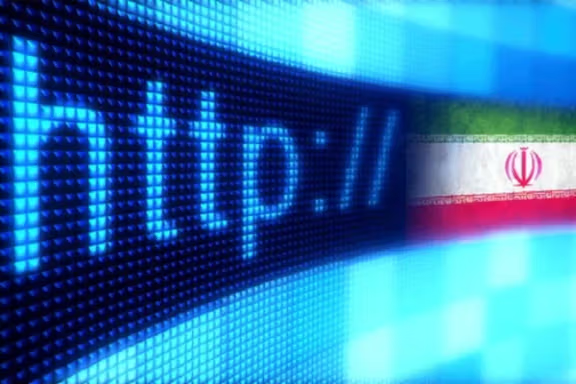
The use of satellite internet system Starlink is growing in Iran amid mounting internet disruptions, as a new report criticizes officials for failing to deliver on pledges to improve connectivity.
“When such disruptions occur, the message to businesses is clear: the infrastructure cannot be trusted. That means instability—and it brings digital development to a halt,” said Pouya Pirhosseinlou, head of the Internet and Infrastructure Committee of the Tehran E-Commerce Association.
In late June, Iran’s parliament passed a law criminalizing the use or import of unauthorized communication tools such as Starlink with prison terms of six months to two years for people found using or importing such equipment without approval.
Anyone found importing more than 10 Starlink terminals “with intent to oppose the Islamic Republic” face five to 10 years in prison under the new statute.
Despite these prohibitions, the committee fifth internet quality report, released on Sunday, said that the use of Starlink satellite internet continues to rise.
The report placed Iran 97th out of 100 countries—ranking only above Cuba, Turkmenistan, and Sudan—detailing chronic slowness, frequent outages, and widespread blocking of services.
The damage from official filtering policies is structural and inescapable, Pirhosseinlou said.
“Even if we had America’s infrastructure, Iran’s internet would still be full of disruptions because of current filtering,” he added. “Filtering equipment is inherently disruptive. It causes serious malfunctions across many emerging protocols and websites.”
The Islamic Republic seeks to contain the growing appeal of Starlink, which offers users access to uncensored, high-speed internet beyond government control.
On June 23, amid the war with Israel, Iran’s Ministry of Communications submitted a formal complaint to the United Nations International Telecommunication Union (ITU), alleging Starlink was operating in Iran without a license.
The Revolutionary Guards-affiliated Fars News published a copy of the complaint, which followed Starlink’s activation inside Iran during widespread wartime internet shutdowns in June.
On June 14, one day into Israel's attacks on Iran, Starlink founder Elon Musk confirmed on X that “the beams are on,” signaling the service was operational as the country's internet went down in huge swathes of Iran.
Pirhosseinlou previously told ILNA that “over 30,000 unique users are utilizing satellite internet,” and the total number of users exceeds 100,000.
VPN use still expanding
However, the situation remains unreliable. “Many websites remain filtered, forcing user traffic through distant, inefficient routes and lowering speed,” Pirhosseinlou said.
“Our findings show that 93 percent of youth and 86 percent of the general public use VPNs. Even on unfiltered websites, users keep VPNs on—further degrading national internet performance.”
“Today, around 700,000 small businesses operate on Instagram. At least one million jobs are tied to that platform alone. Disruptions here directly hit people’s livelihoods.”
Government pledges remain unmet
Hamidreza Ahmadi, vice-chair of the committee, agreed, and criticized recent government promises to ease restrictions in a country where livelihoods depend on being connected.
Platforms like Instagram and Telegram remain central to Iran’s informal economy. “Based on survey data, 60 percent of people earning income from social media name those two platforms as their main sources of revenue," he said.
Continued instability risks compounding social and economic damage, he warned. “This situation threatens the capital—both social and financial—that has formed on these platforms.”
During June's 12-day war with Israel, the government imposed massive blackouts across the country, citing security concerns, but since the ceasefire, issues remain.
“On June 25, the minister said the internet had returned to its previous [pre-war] state. But technical data didn’t support this. Days after the ceasefire we see slight improvements—and serious technical issues still persist," Ahmadi added.
Pirhosseinlou directly challenged the president’s election campaign last year on internet freedom. “If the president has promised access to a free internet but cannot convince the Supreme Cyberspace Council to lift restrictions, then either he has to change the views—or he should resign.”
In October, rights watchdog Freedom House ranked Iran as having the world’s third most repressive internet environment.
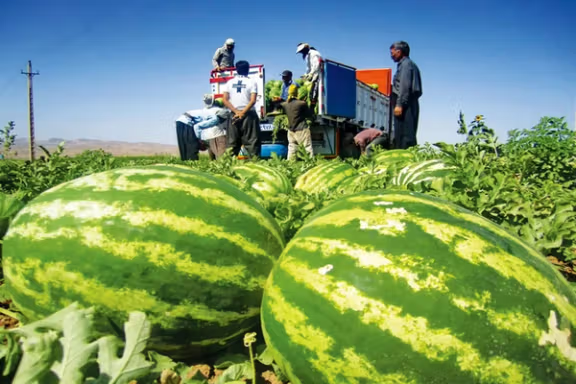
As Iran faces a deepening water crisis, a recent report by The Economist shows how the Islamic Republic is quietly flooding Persian Gulf markets with fruit and vegetables through a sprawling export scheme.
“The Islamic Republic… is in a serious pickle,” The Economist wrote in its Friday report.
Flooding the Persian Gulf with fruit and veg is one of its ways to pay for foreign goods it so desperately needs, added the outlet, saying “Iran now supplies nine out of ten cauliflowers, tomatoes and watermelons imported by the UAE.”
The trade relies on large state subsidies that make water, fertilizers and energy almost free.
Iran’s greenhouse cultivation has more than tripled in area since the early 2010s, supported by imported technology from countries including China and the Netherlands. Much of the equipment, The Economist wrote, originates from Israel—“a leader in the field”—though routed indirectly.
But this export boom is exacerbating water scarcity across Iran. With agriculture consuming over 90% of available water, and government support concentrated on export-focused farms, residents in cities like Tehran, Isfahan, Mashhad, and many others endure hours-long daily shutoffs. Officials have warned of a collapse of groundwater resources and irreversible environmental damage.
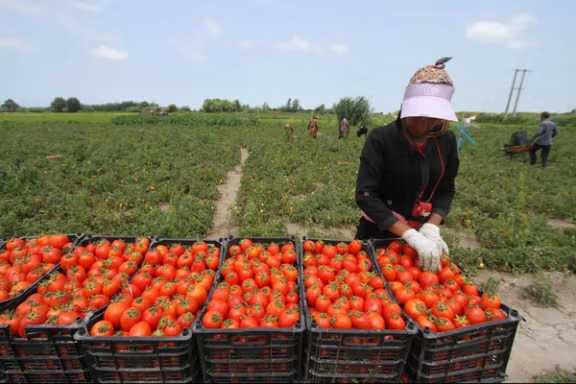
Across Iran, families are enduring days without running water. Many are stockpiling bottles, installing rooftop storage tanks, or relying on tanker deliveries—some of which provide unsafe supplies.
Satellite images obtained by Iran International show that Tehran’s main reservoirs—Amir Kabir, Lar, and Latyan—are at historic lows, holding less than 10% of their usable volume.
At the same time, the capital is physically sinking. Excessive extraction from depleted groundwater resources has caused sections of Tehran to subside by more than 25 centimeters per year.
Iran's produce in Sharjah port
The report by the Economist details how Iran’s produce reaches the UAE’s Sharjah port via small ships from Bandar Lengeh, south of the country.
From there, trailers carry shipments to Dubai’s Al Aweer market, the region’s largest wholesale food hub, where wholesalers blend Iranian goods with other imports or repackage them entirely.
Labels are swapped to hide origin—“We just put a sticker on the carton with a new origin: Azerbaijan, Turkey—anything but Iran,” one trader said.
The export trade operates through a parallel financial system. Formal banking channels are avoided due to US sanctions, so traders use the informal system to settle payments.
UAE-based middlemen collect dirhams from food buyers and channel them to Iranian exporters—often in exchange for vital machinery and appliances Tehran cannot otherwise import.
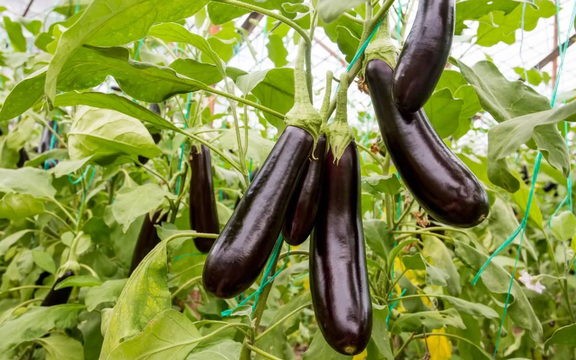
The Economist estimated the value of this clandestine export trade at $4bn to $5bn in 2024 alone.
Iran’s fruits often reach Persian Gulf supermarkets disguised and mispriced. Wholesalers inflate margins by mixing cheap Iranian tomatoes with Dutch imports and reselling the lot as premium goods.
“Instead of 4–5 dirhams, they sell the lot for 20–25 dirhams per kg,” said one insider. Some retail chains fly their staff business class and house them in luxury hotels—funded by “blended” produce profits, according to The Economist.
Despite occasional anti-dumping probes, Persian Gulf states appear to tolerate the flow. The report suggests some governments may see cheap Iranian food as a way to control inflation—or even preserve their own scarce groundwater by outsourcing farming to Iran.
But as water crisis deepens across Iran and key basins dry beyond recovery, Tehran’s strategy of exporting fruit may prove unsustainable. “However tempting,” The Economist warned, “bingeing on Iranian produce looks like a recipe for trouble.”
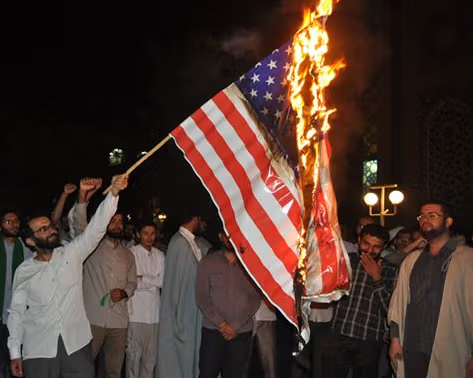
The Islamic Republic is holding at least four Iranian American citizens including two individuals arrested after last month's US and Israeli airstrikes, The New York Times reported Saturday, citing rights groups and lawyers.
“Three of the Americans are in jail, and one has been barred from leaving the country,” the New York Times wrote, quoting individuals familiar with the detentions.
Hostage Aid Worldwide, a nonprofit that aids families of detainees, was quoted as saying it remains in contact with the detainees’ friends and relatives, and that all four had traveled to Iran from the United States to visit family.
Two of the four were arrested by security forces shortly after Israel’s attacks on Iran in June, according to the Human Rights Activists News Agency (HRANA) and Hengaw, independent rights groups based outside the country.
The other two were arrested last year, the report said.
The detentions “are likely to increase the already tense political climate between Tehran and Washington after the United States joined Israel’s attack on Iran and bombarded and severely damaged three of its nuclear sites in June," the report added.
One is a 70-year-old Jewish man from New York, a father and grandfather who runs a jewelry business. Rights groups and the man’s colleagues and friends said he is being questioned over a past trip to Israel.
HRANA identified him as Yehuda Hekmati on July 28.
Another case involves a California woman previously held in Evin prison, whose whereabouts remain unclear after the prison was attacked by Israel and evacuated.
Kylie Moore-Gilbert, an Australian British academic formerly imprisoned in Iran, confirmed the details, according to The New York Times.
A third Iranian American woman, initially detained in December 2024, is now out of prison but cannot leave the country, the report said. “She is currently out of prison, but her Iranian and American passports were confiscated."
Her US-based lawyer said that after the war, “the Iranian judiciary elevated her case and charged her with espionage.”
Reza Valizadeh, a US-Iranian journalist and former Radio Farda employee, was also arrested in October 2024 while visiting family and later sentenced to 10 years for “collaborating with a hostile government.”
Two Iranian officials told the Times that the New York man and California woman were detained as part of a crackdown on suspected operatives linked to Israel and the US.
The arrests come as President Masoud Pezeshkian has publicly urged members of the Iranian diaspora to return, saying he would coordinate with the intelligence and judiciary ministries to ease the process, according to local media.
“We have to create a framework so that Iranians living abroad can come to Iran without fear,” he said last week.
The United States on Friday advised citizens against traveling to Iran citing what it called escalating paranoia and an unprecedented crackdown on alleged spies and opponents following the 12-day war with Israel.
"The Iranian regime, following the 12-day war with Israel, is in the midst of unprecedented paranoia and a crackdown on spies and regime opponents," the State Department said in a post on its Persian X account USA Beh Farsi.
"Anyone considering travel to Iran should reconsider their decision. We repeat: US citizens should not travel to Iran!" the post reads.

Iran’s Islamic Revolutionary Guards Corps (IRGC) on Saturday slammed efforts to promote a two-state solution to the Israeli-Palestinian conflict, a few days after a UN conference co-chaired by Saudi Arabia pushed for the solution.
“These satanic efforts are prescribing a two-state solution to end the Palestinian issue,” the IRGC said in a statement, marking the first anniversary of the Israeli killing of Hamas leader Ismail Haniyeh in Tehran.
“But the resistance remains firm on the path of martyr Haniyeh and others.”
The Guards said the path forward lies not in political compromise but in continued resistance. Quoting a Hamas slogan attributed to Haniyeh, the statement said: “We do not recognize Israel—never, never, never.”
A High-Level International Conference for the Peaceful Settlement of the Question of Palestine and the Implementation of the Two-State Solution took place at the United Nations in New York from July 28-30, 2025.
The conference, co-chaired by France and Saudi Arabia, aimed to revitalize efforts towards a two-state solution between Israel and the Palestinians, with a focus on achieving a just and lasting peace.
Traditionally, Iran has advocated for the annihilation of Israel, rejecting a two-state solution that would create an independent Palestinian state alongside Israel. Supreme Leader Ali Khamenei said in 2015 that Israel must be destroyed within 25 years.
Gaza war
The IRGC's statement described the war in Gaza as a genocide carried out with the broader aim of seizing strategic and resource-rich regions of the Islamic world.
“Those who engineered the genocide in Gaza are undoubtedly pursuing larger goals—the swallowing of the Muslim world’s rich and strategic regions,” it said.
“But with God’s help, the breaking of global silence and the surge of anti-Zionist international protest will shatter the hopes and ambitions of the Zionist-American criminal band, which must now await the unmasking of its hidden fate.”
It also condemned the killing of Haniyeh in Tehran, which occurred while he was in the city for Iran’s presidential inauguration.
The IRGC credited continued Palestinian resistance to what it called the legacy of Haniyeh and other slain leaders of the anti-Israel struggle.
“The Aqsa Storm was not a passing event but a strategic doctrine sealed by the blood of martyrs,” it said, referencing the October 7, 2023 Hamas attack on Israel.
Since the October 7 attacks which saw at least 1,200 people killed and more than 250 more taken hostage by the militant group, Israel’s military campaign has killed over 53,000 people in Gaza, according to the Hamas-run Ministry of Health statistics.
The Israeli military says at least 20,000 of those are militants.
Accusing Israel of using starvation and siege as instruments of war, the IRGC called on international organizations to recognize such tactics as war crimes and to impose serious sanctions on the Israeli government.
“The deliberate creation of famine is a recognized crime against humanity,” the statement said.
The IRGC, a powerful parallel military in Iran with extensive economic and intelligence roles, was designated a terrorist organization by the United States in 2019 under President Donald Trump. Washington and Ottawa have called on European allies to follow suit.